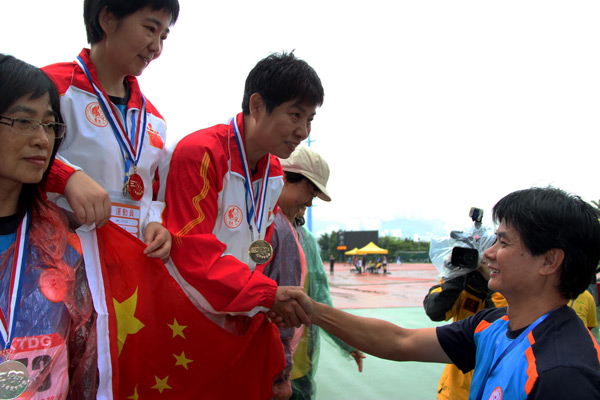Organ recipient has a sporting chance
Updated: 2013-06-13 07:24
By Wang Qingyun (China Daily)
|
||||||||
 |
|
He Xin, who underwent a liver transplant in 2006, accepts a medal in a sports meeting for organ transplant recipients in Hong Kong in November. PROVIDED TO CHINA DAILY |
He Xin is looking forward to taking part in the 19th World Transplant Games in South Africa in July.
It will be the second time the 53-year-old has competed, and she hopes she will emerge victorious from the biennial event as she did in 2011.
She took part in the games in Sweden alongside 20 other Chinese athletes and claimed a silver and two golds in table tennis.
Just two years after undergoing a liver transplant at Beijing You'an Hospital in 2006, she was in action at the 2008 National Transplant Games in Shanghai.
"It was the first time I'd taken part in such an event," she said. "I met a lot of people like me who were all healthy."
Competing in the World Transplant Games is a chance to show how much people can achieve after a transplant, and she hopes the government can be more supportive of such events.
"I almost died once, now I feel much better and more confident in my ability to compete," she said. "Also, I'm part of a group competing for China, a country where a great number of people have had organ transplants.
"The games in 2011 cost me 20,000 yuan ($3,230). I got sponsorship from You'an Hospital and a pharmaceuticals company and managed to get the fees reimbursed. But there are many more people who are willing to take part in the World Transplant Games but cannot because they can't get financial support."
Zhong Qinghua, who partnered He to win a gold medal at the 2011 games in Sweden, decided not to participate in South Africa because he cannot get financial help.
The 52-year-old used to run a printing factory before receiving a transplant in 2002, while He runs a company selling gifts. Their financial status makes it possible for them to meet the cost of surgery, normally running into several hundred thousand yuan.
Yet drugs and medicine are another factor. There is a great risk of organ rejection after any transplant and drugs are vital to safeguard against this.
He Xin, who is also a member of the Beijing Union of Liver Transplant Receivers, said: "We had to write and talk to people at the national and Beijing healthcare insurance authorities numerous times before Beijing finally (in 2010) included anti-rejection drugs for people who had liver transplants into its healthcare insurance program."
wangqingyun@chinadaily.com.cn

 Michelle lays roses at site along Berlin Wall
Michelle lays roses at site along Berlin Wall
 Historic space lecture in Tiangong-1 commences
Historic space lecture in Tiangong-1 commences
 'Sopranos' Star James Gandolfini dead at 51
'Sopranos' Star James Gandolfini dead at 51
 UN: Number of refugees hits 18-year high
UN: Number of refugees hits 18-year high
 Slide: Jet exercises from aircraft carrier
Slide: Jet exercises from aircraft carrier
 Talks establish fishery hotline
Talks establish fishery hotline
 Foreign buyers eye Chinese drones
Foreign buyers eye Chinese drones
 UN chief hails China's peacekeepers
UN chief hails China's peacekeepers
Most Viewed
Editor's Picks

|

|

|

|

|

|
Today's Top News
Shenzhou X astronaut gives lecture today
US told to reassess duties on Chinese paper
Chinese seek greater share of satellite market
Russia rejects Obama's nuke cut proposal
US immigration bill sees Senate breakthrough
Brazilian cities revoke fare hikes
Moody's warns on China's local govt debt
Air quality in major cities drops in May
US Weekly

|

|







